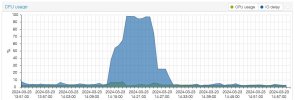Hello everyone,
I’ve been facing a persistent issue for some time now, and I would greatly appreciate advice from more experienced members on how to resolve it. I’ve tried Googling and experimenting with different solutions, but so far, nothing has worked.
The problem is the high I/O delay I experience, which completely freezes all the VMs running on my server. This typically happens during moderately intensive disk operations. For example, if I use `yt-dlp` inside one of the Linux VMs to download a slightly longer YouTube video and then copy it elsewhere (e.g., to a remote share or server), the I/O delay often jumps to 100% at stays like that for a couple of minutes making the all VMs unusable. This delay sometimes occurs immediately after the download or during the file transfer, causing the entire system to freeze for several minutes.
Here’s my setup:
- Proxmox version: 8.1.4 (but it was the same with version 7)
- Hardware: Intel i7-2600 CPU, 32 GB RAM, a mix of SSDs and HDDs.
- Storage setup:
- Proxmox is installed on a ZFS pool of two mirrored 128 GB consumer-grade SSDs.
- VMs run on another ZFS pool (`zfs-storage`) with two mirrored 1 TB consumer-grade SSDs.
- An additional HDD is formatted with ext4 and mounted inside one of the VMs.
At one point, I added an Intel SSDSC2KB48 SSD as a ZIL drive for the `zfs-storage` pool, hoping to alleviate the I/O delay bottleneck. Unfortunately, this did not resolve the issue.
I understand that the CPU and memory aren’t particularly high-end. However, this is a home server currently running only:
1. A VM with Incredible PBX.
2. A VM with Ubuntu, which is used only occasionally.
3. A CT running a few docker containers.
I chose ZFS for its redundancy benefits, knowing that it typically requires more RAM than my setup offers. I love Proxmox but these freezes are discouraging me from utilizing it more as I would like. Would it make sense to switch to a setup with software RAID and than manually install Proxmox on top of it instead of using automated install and opting for ZFS?
Any advice on resolving these issues would be highly appreciated. Thank you!
I’ve been facing a persistent issue for some time now, and I would greatly appreciate advice from more experienced members on how to resolve it. I’ve tried Googling and experimenting with different solutions, but so far, nothing has worked.
The problem is the high I/O delay I experience, which completely freezes all the VMs running on my server. This typically happens during moderately intensive disk operations. For example, if I use `yt-dlp` inside one of the Linux VMs to download a slightly longer YouTube video and then copy it elsewhere (e.g., to a remote share or server), the I/O delay often jumps to 100% at stays like that for a couple of minutes making the all VMs unusable. This delay sometimes occurs immediately after the download or during the file transfer, causing the entire system to freeze for several minutes.
Here’s my setup:
- Proxmox version: 8.1.4 (but it was the same with version 7)
- Hardware: Intel i7-2600 CPU, 32 GB RAM, a mix of SSDs and HDDs.
- Storage setup:
- Proxmox is installed on a ZFS pool of two mirrored 128 GB consumer-grade SSDs.
- VMs run on another ZFS pool (`zfs-storage`) with two mirrored 1 TB consumer-grade SSDs.
- An additional HDD is formatted with ext4 and mounted inside one of the VMs.
At one point, I added an Intel SSDSC2KB48 SSD as a ZIL drive for the `zfs-storage` pool, hoping to alleviate the I/O delay bottleneck. Unfortunately, this did not resolve the issue.
I understand that the CPU and memory aren’t particularly high-end. However, this is a home server currently running only:
1. A VM with Incredible PBX.
2. A VM with Ubuntu, which is used only occasionally.
3. A CT running a few docker containers.
I chose ZFS for its redundancy benefits, knowing that it typically requires more RAM than my setup offers. I love Proxmox but these freezes are discouraging me from utilizing it more as I would like. Would it make sense to switch to a setup with software RAID and than manually install Proxmox on top of it instead of using automated install and opting for ZFS?
Any advice on resolving these issues would be highly appreciated. Thank you!


